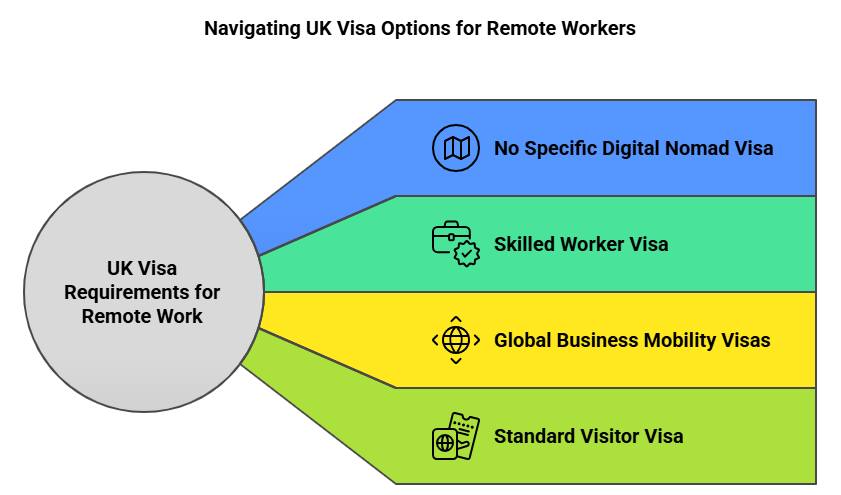Growth of the UK Digital Economy
The UK's digital economy is expected to add hundreds of billions of pounds to the national GDP by the end of the decade. Much of this growth is being fuelled by the widespread adoption of digital technologies such as artificial intelligence (AI), machine learning, and data analytics. In recent years, more UK businesses have begun integrating AI into their operations, driving productivity and reshaping traditional sectors like finance, healthcare, logistics, and education.
Increased investment from both the private and public sectors has helped accelerate this transformation. Major global tech companies have announced multi-billion-pound commitments to AI research, data centers, and digital infrastructure in the UK. This makes the country one of the most attractive destinations for digital startups and innovation-driven enterprises.
Regional Development
While London continues to lead with the largest concentration of digital jobs and infrastructure, other regions are catching up. Cities like Manchester, Leeds, Birmingham, and Edinburgh are establishing themselves as tech and innovation hubs, offering strong support ecosystems for startups and scale-ups. However, some regions—particularly in Wales and the South West—still lag behind in digital adoption. Bridging these regional gaps could unlock billions in untapped economic potential.
Rise of Remote and Hybrid Work in UK
Remote and hybrid work have become an integral part of the UK employment landscape. After the pandemic popularised flexible work, many organisations retained remote-friendly policies. A significant portion of the workforce—particularly in the tech, media, and consulting sectors—works in hybrid arrangements, combining home and office days.
Employers are increasingly recognising the benefits: cost savings, wider talent pools, and improved work-life balance for employees. Digital tools such as cloud-based collaboration software, video conferencing, and virtual private networks (VPNs) have made remote work seamless and productive.
Digital Nomad Potential
The UK government has been exploring ways to accommodate remote foreign workers through visa reforms and flexible immigration policies. Although there is no official “digital nomad visa” yet, discussions are ongoing about tailored visa pathways for highly skilled remote professionals, freelancers, and contractors who want to live and work in the UK temporarily.
For British citizens and residents, remote work has opened up global job opportunities. Professionals can now work for companies abroad while living in the UK, thanks to international remote contracts and borderless employment platforms.
Opportunities for Workers and Businesses in the UK
Remote work continues to reshape the UK job landscape, offering new opportunities for both professionals and businesses. As technology bridges geographic gaps, remote roles are becoming central to a flexible, skills-driven economy.
For Employees
- Expanded job market: Professionals no longer need to relocate for top-tier opportunities, especially in tech and digital sectors.
- Flexible lifestyles: Remote roles allow greater flexibility in terms of living arrangements, childcare, and personal wellness.
- Upskilling demand: There’s growing demand for digital skills, including coding, data science, UX/UI design, cybersecurity, and cloud architecture.
For Employers
- Access to global talent: Companies can hire international professionals with diverse skill sets without being limited by geography.
- Cost efficiency: Remote-first operations reduce overhead costs and allow businesses to invest more in innovation and talent development.
- Productivity gains: Studies suggest that remote workers are often more productive, especially when given autonomy and clear goals.
In-Demand Remote Roles in UK
Remote work continues to thrive across multiple industries, especially in the digital, creative, and tech sectors. Here are some of the most in-demand remote roles in the UK and globally:
1. Software Developers & Engineers
Demand remains high for professionals skilled in full-stack, front-end, back-end, mobile app, and cloud development.
Key skills: JavaScript, Python, Java, React, Node.js, AWS, Docker.
2. Data Analysts & Data Scientists
As companies become more data-driven, experts who can analyze and interpret data to inform decisions are critical.
Key skills: SQL, Python, R, Power BI, Tableau, machine learning.
3. Digital Marketing Specialists
From SEO and PPC to content and email marketing, companies seek experts to build and manage their online presence.
Key skills: Google Ads, SEO tools, analytics, copywriting, CRM platforms.
4. Cybersecurity Experts
Remote work increases security risks, leading to high demand for professionals who can protect systems and data.
Key roles: Security analysts, penetration testers, compliance officers.
5. UX/UI Designers
Creating intuitive and attractive digital experiences is crucial for web and app development.
Key tools: Figma, Adobe XD, Sketch, InVision.
6. Project Managers (Agile/Scrum)
Remote teams require skilled coordinators to manage timelines, workflows, and communication.
Popular frameworks: Scrum, Agile, Kanban, Jira, Trello.
7. E-Commerce Specialists
With continued growth in online retail, roles in e-commerce operations, product management, and digital merchandising are increasing.
Platforms: Shopify, WooCommerce, Magento, Amazon Marketplace.
8. Content Creators & Copywriters
Businesses constantly need written, video, and social media content to engage users and customers.
Niches: Technical writing, SEO writing, social media content, video scripting.
9. AI & Machine Learning Engineers
Companies investing in AI tools and automation need engineers who can build intelligent systems.
Key skills: TensorFlow, NLP, deep learning, computer vision.
10. Customer Support Representatives
Customer service has largely shifted online, with remote reps supporting customers across chat, email, and video.
Trends: 24/7 multilingual support, chatbot integration, CRM platforms like Zendesk.
UK Visa Requirements for Remote Work
It's crucial for international professionals seeking remote work opportunities in the UK to understand the visa regulations:
- No Specific Digital Nomad Visa: The UK does not offer a dedicated "digital nomad" visa that allows individuals to live in the UK and work remotely for an overseas company as their primary purpose.
- Skilled Worker Visa: For those seeking to work remotely for a UK-based employer, the Skilled Worker visa is a potential route, provided the role meets the required skill level and salary thresholds, and the employer is a licensed sponsor. Even if the role is primarily remote, the employer must be UK-based and sponsor the visa.
- Global Business Mobility Visas: Certain routes under the Global Business Mobility visa category might be relevant for employees of multinational companies who are being transferred to the UK but may work remotely for the overseas entity while based in the UK.
- Standard Visitor Visa: While recent updates permit some incidental remote work for an overseas employer while visiting the UK, this is strictly for short-term visits where the primary purpose is tourism, visiting family, or other non-work-related activities. It is not intended for individuals whose main purpose is remote work in the UK.
Challenges and Considerations for Digital and Remote Work Trends
While the digital and remote work trends offer significant advantages, there are challenges to address:
- Digital inclusion: Ensuring that rural and underserved regions have adequate internet connectivity and tech infrastructure.
- Work-life boundaries: Remote workers may struggle with isolation or overworking without proper balance.
- Cybersecurity risks: With remote work expanding, businesses need to invest in secure systems and training to prevent data breaches.
Looking Ahead
The UK is well-positioned to lead in the global digital economy and remain a hub for innovation and remote work. By continuing to invest in infrastructure, digital education, and smart immigration policy, the country can harness the full potential of this shift. For individuals and businesses alike, 2025 presents a unique moment to embrace change, adapt to new ways of working, and explore exciting digital possibilities.





To help us improve